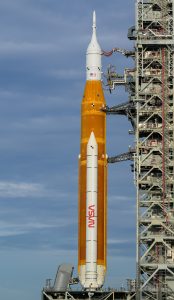After standing down on the Artemis I launch attempt Saturday, Sept. 3 due to a hydrogen leak, teams have decided to replace the seal on an interface, called the quick disconnect, between the liquid hydrogen fuel feed line on the mobile launcher and the Space Launch System (SLS) rocket while at the launch pad.

Performing the work at the pad requires technicians to set up an enclosure around the work area to protect the hardware from the weather and other environmental conditions, but enables engineers to test the repair under cryogenic, or supercold, conditions. Performing the work at the pad also allows teams to gather as much data as possible to understand the cause of the issue. Teams may return the rocket to the Vehicle Assembly Building (VAB) to perform additional work that does not require use of the cryogenic facilities available only at the pad.
To meet the current requirement by the Eastern Range for the certification on the flight termination system, NASA would need to roll the rocket and spacecraft back to the VAB before the next launch attempt to reset the system’s batteries.
Additionally, teams will also check plate coverings on other umbilical interfaces to ensure there are no leaks present at those locations. With seven main umbilical lines, each line may have multiple connection points.
